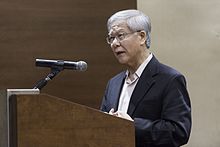Chan Sek Keong
|
Chan Sek Keong DUT (2nd Class) |
|
|---|---|
| 陈锡强 | |
 |
|
| 3rd Chief Justice of Singapore | |
|
In office 11 April 2006 – 6 November 2012 |
|
| Appointed by | S. R. Nathan |
| Preceded by | Yong Pung How |
| Succeeded by | Sundaresh Menon |
| Attorney-General of Singapore | |
|
In office 1 May 1992 – 10 April 2006 |
|
| Appointed by | Wee Kim Wee |
| Preceded by | Tan Boon Teik |
| Succeeded by | Chao Hick Tin |
| Judge of the Supreme Court of Singapore | |
|
In office 1 July 1988 – 1 May 1992 |
|
| Appointed by | Wee Kim Wee |
| Judicial Commissioner of Singapore | |
|
In office 1 July 1986 – 1 July 1988 |
|
| Appointed by | Wee Kim Wee |
| Personal details | |
| Born |
5 November 1937 Ipoh, Perak, Federated Malay States |
| Alma mater | National University of Singapore Faculty of Law |
| Religion | Roman Catholic |
Chan Sek Keong, S.C., DUBC DUT (2nd Class) (simplified Chinese: 陈锡强; traditional Chinese: 陳錫強; pinyin: Chén Xī Qiáng; Jyutping: Can4 Sek3 Koeng5; born 5 November 1937) was the third Chief Justice of Singapore, succeeding Chief Justice Yong Pung How on 11 April 2006 and holding office until 6 November 2012. Chan had earlier served as the Attorney-General of Singapore from 1992 to 2006.
Chan was born on 5 November 1937 in Ipoh, Perak, in Malaysia, the third of five children. His father was a bank clerk in the Hong Kong and Shanghai Bank. When the Japanese occupation of Singapore began, they fled to Taiping to stay with his grandfather.
He received his early education in King Edward VII School in Taiping together with his elder brother, and continued at the Anderson School when they moved back to Ipoh after the war ended in 1945. Chan, who was then eight years old, was placed together with other children who had missed entering school at the usual age of six years. At the time, Anderson School was the premier government school in Ipoh. He was happy in school, and mixed well with students from other races. In 1955, Chan scored eight distinctions for his Senior Cambridge School Certificate examinations – one of the best in Malaya that year. He was offered a teaching bursary. However, as becoming a teacher was not what he envisaged, he continued on to the Sixth form in hopes of securing a university.
...
Wikipedia
